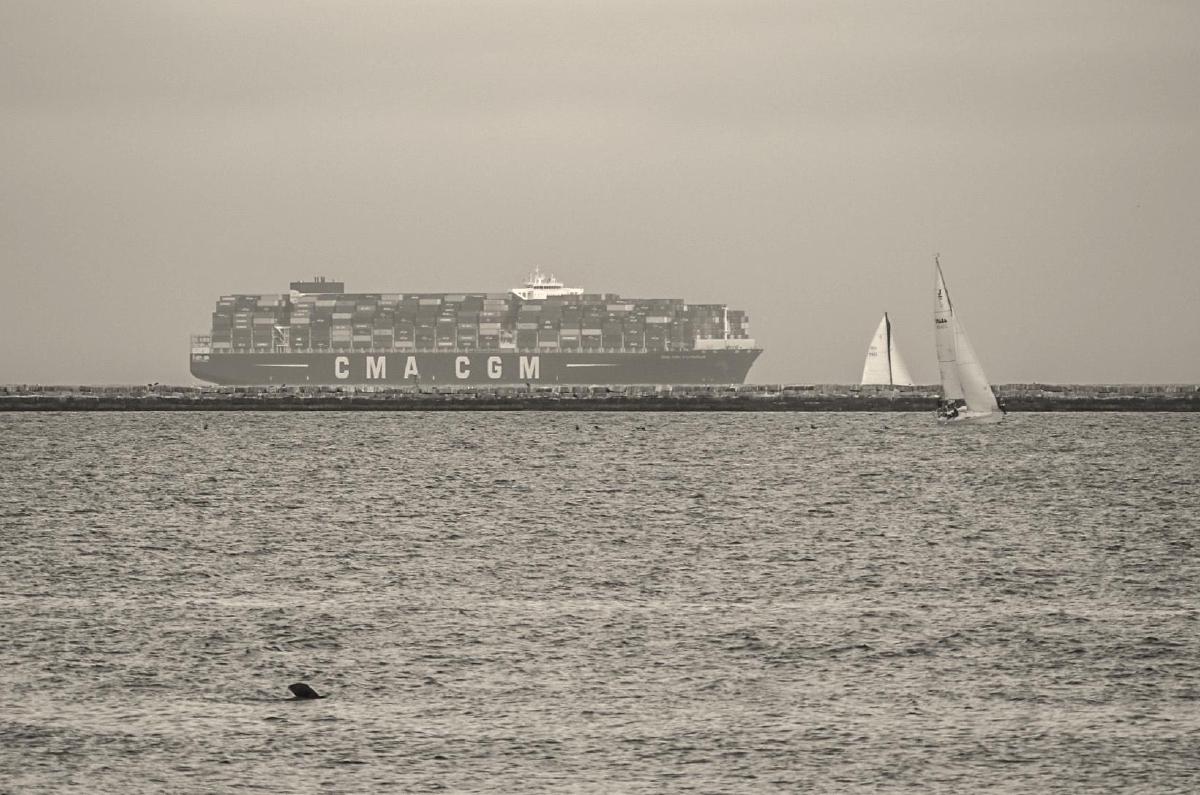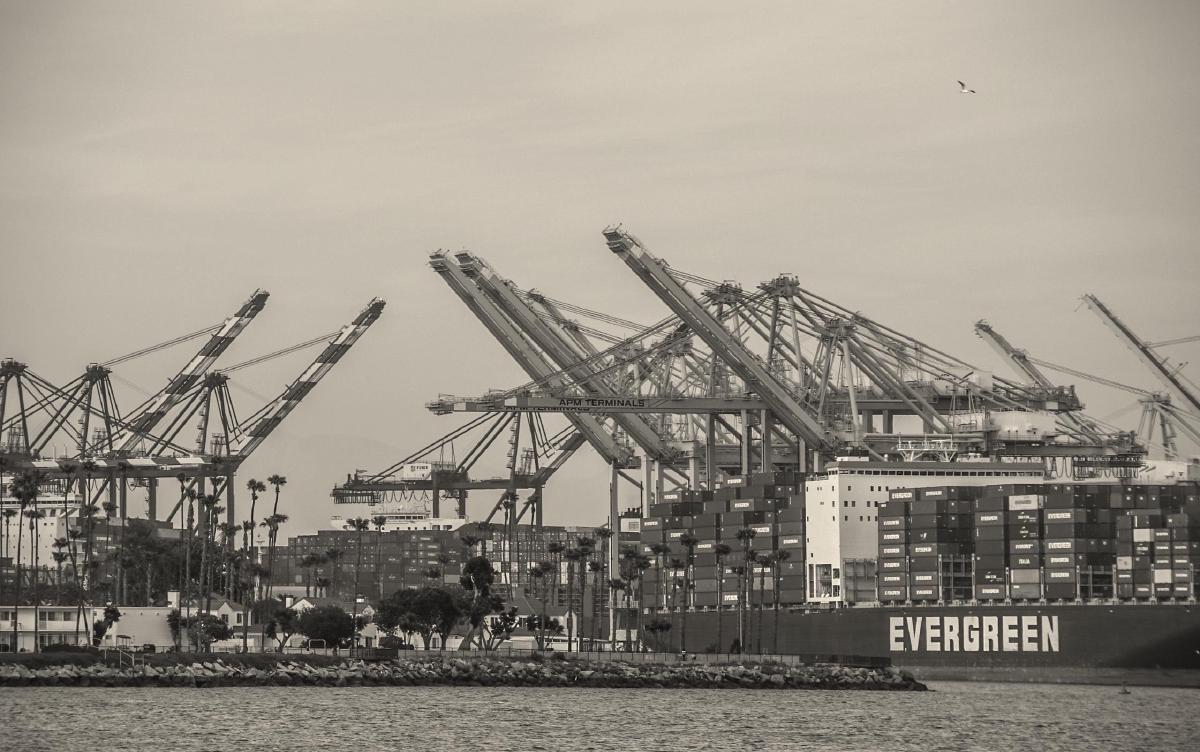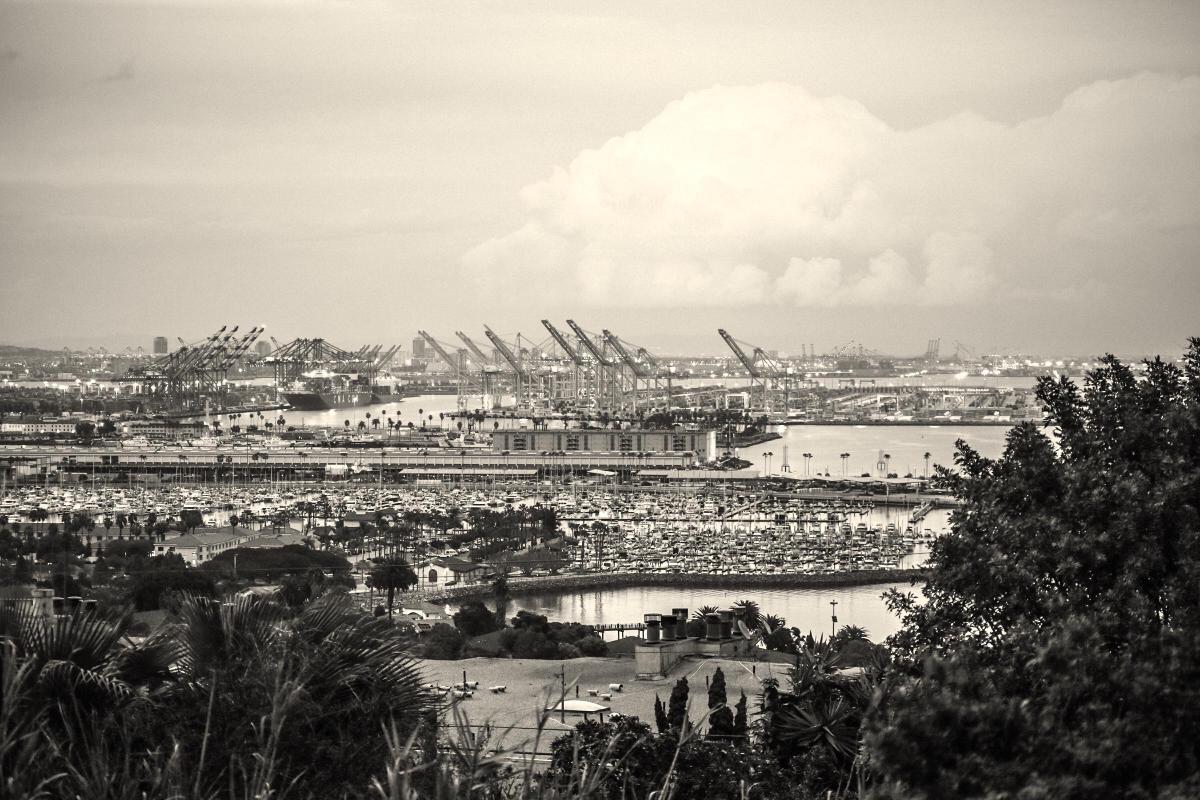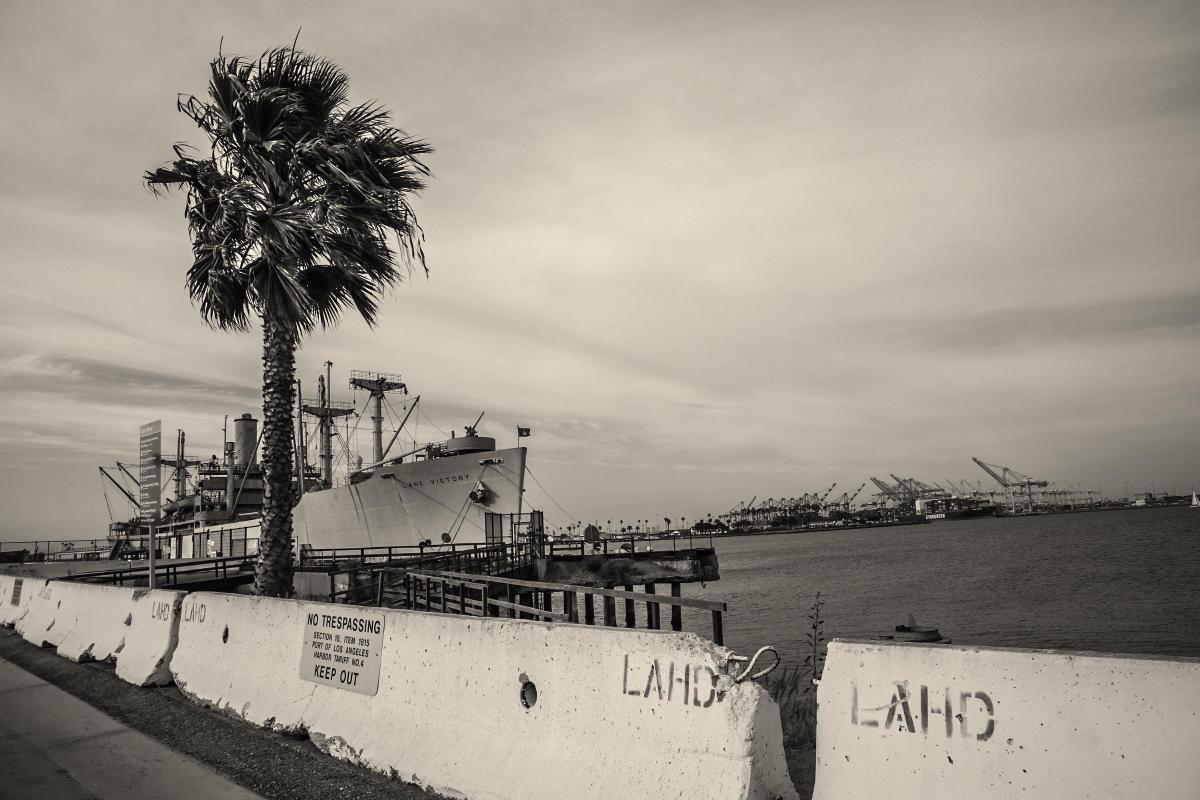Motion Sickness
At night, if you park on one of the lonely high streets between San Pedro and Long Beach, you can watch the dockside gantry cranes unload the containers from ships recently arrived from across the sea. They’re large, gangly, mechanical things, with wires and pulleys and the sound of metal clanging as the spreaders lock onto the four lift points of a new load before hoisting it skyward. The Port at San Pedro has high profile and low profile cranes all along and across Terminal Island, connecting to and melding with more cranes and containers at the Port of Los Angeles beside it. In the darkness, the cranes loom tall and alive, lit up by spotlights and safety lights and, it seems, lights on every sharp point against the horizon.
Before shipping containers took over intercontinental logistics, goods were shipped in wooden crates that longshoremen hoisted with box hooks, passing them man to man and restacking for distribution and shipment. Underpaid and overworked, they sometimes took their taste, setting aside an item here or there to take home. An unofficial tax to lighten the backbreaking load. Every crane replaced hundreds of men. Every scale became a better snitch than an informant in the ranks. The mechanization of labor was supposed to be about increased leisure for everyone. Instead, it has removed the human grace from our systems, those pressure points where individual men could make choices about individual goods, and, in an act of what gets called corruption, what gets punished as stealing, diminish the exploitation of their own labor. Owners ask men, now, to maintain the machines that replaced them. The machines do not care that they labor. They do not hunger, like men, for recognition. They do not take back.

I pilgrimage to the high street and watch the cranes hoist and sort. Small beside them, forklifts and men move about – ants among giants. Their god is far away, asleep somewhere, ready to rise at morning light and check a computer screen to survey the dock reports. You could say my interest in this place is theological. You could say my obsession is foolish. I have no business here, but consumption: I know that somewhere in those blue and orange and red containers is the fish I will eat at a sushi restaurant, the car I will honk at on the city’s streets, the clothes I will wear and discard. Somewhere too, interspersed among other, less interesting goods for import/export, is the heroin that will kill someone’s brother, that will be handed from dock to man — then hand to hand across a whisper network.
If I brought you with me, to watch, I would not mention these things.
It has never gone well when I have. Instead, I would point out a container, rising against the strictures of gravity into the arms of a crane, cradled like a child by its mother. We could speculate about its contents and then watch for another. And another. Maybe I would suggest we drive through Terminal Island from Long Beach to San Pedro and then circle around again. As we passed, I would point out the federal prison situated amongst the docks, holding men stationary where goods move freely. They’re just in there, I would say, never quite at ease with the reality of incarceration. I would change the subject and suggest we go to 7/11 and get snacks. And then, when we parked again to watch, you would sip your coffee. I would ask you if you were cold and offer you a blanket from inside the car, wrapping it around your shoulders to keep you warm.
You’re not here though — and I am alone on an early April Saturday evening, sitting and listening. Watching the industrial light sparkle across the water. The air smells of burnoff from the nearby oil refinery. On the other side of this isthmus is the remnants of the Sunken City, so named for a once-idyllic neighborhood on Point Fermin that tumbled in a landslide. Forty thousand square feet of land reclaimed by the ocean. Left behind: concrete foundations in tiered and uneven settlement, tagged by graffiti artists. The moon is in the west and no doubt the sunlight reflected on its face now passes across the lonely broken pieces. Further north and further south, couples are walking on the sand with their shoes off while sharks hunt in the dark waters. An octopus sleeps in its coral burrow. I cannot see them, although I think of them more than I probably should. I am afraid of the ocean for the same reason I am afraid of caves: that is not where I belong.
I belong on land, not below or above it, nor at sea, beside it. And, if I had my way, I would travel by train and truck, like the containers I am watching being loaded onto chassis on the train tracks and nearby empty semi-trailers. When they are full, locomotives and big rigs will take them to distribution centers throughout southern California. On other drives I have ridden through the backstreets of the City of Industry and further north, along Washington Avenue, where imports are unloaded into great warehouses that serve as way stations for the industrial and commercial goods we buy or use. I am not invited in. I am a strange witness, passing through. There, too, are the parked RVs of the semi-housed, safe from skid row but without a permanent roof to call home. They find curbs to hide beside in industrial landscapes without hostile Home Owners Associations. They pull curtains over their windows. Who knows their names?
When I get hungry, I drive a while, north on Normandie. On a sidewalk, two men have set up an outdoor kitchen with a meat spit and griddle on folding tables. Bins of chopped vegetables and sauces. They ask what I want. We all wear masks, because of the pandemic. Three chicken tacos, I say. They work, illuminated by string lights beneath a stretched tarp. The line is ten deep, even though it is close to midnight. The tacos come folded together on parchment atop a paper plate. I choose from the selection: chopped onions and cilantro, a bit of lime, and a dark chipotle salsa as garnish. I return to my car to eat, parked on a sidestreet where traffic won’t find me. The tacos are delicious.

You were someone specific, in the past. You meant Cherie. You meant William. We ran around in love, filling the night hours with our curiosity. Letting our movement through the streets of Los Angeles mimic our movement through time. We’d talk about our childhoods and what had worked out, what hadn’t. I came out here for an internship at Anonymous Content, you, Cherie, said. Only one of our cohort got hired full time. I guess I was supposed to talk someone into making me a PA or Script Supervisor, but I needed more rent money. You said this to me with grief in your voice. The hurt of class. You changed your clothes, got a Series 7. There’s money in money, you said.
But you, William, you already had money. You were a lawyer who believed in order, who thought it was amusing that I liked these concrete landscapes. You found me odd (I could hear it in your laughter), and you enjoyed being surprised by what I had to say next. You thought I should be grateful for your attention. You never understood that I never wanted an audience.
First, I loved you, then: hate. It’s why I have no you to talk to now. No you in the seat beside me as I wipe the salsa from my chin. I am told my aloneness is a defect, evidence of my unsuitability. My mother worries about me when I am alone. Why does she not worry about me when I am not? I am worried for my friends with spouses. I am watching them hew off the sparkling and sharp opinions they once shouted on drunken nights along Sunset Boulevard, laughing with joy, pulsing with careless inhibition. Tarantino can suck my twat, Claire had screamed at the polished and twisted hills. We had been too long in the Viper Room, shouting about movies about men, and we were nearly deaf from the music. Then, last week, on Zoom: at least we saw ‘Once Upon a Time in Hollywood’ in the theatres before Covid-19 hit. Her husband was present somewhere in the background, no doubt hardly listening to our “girl talk.” It was an edit of anticipation. An edit of expedience. I nodded because I know what it is like to pine for a before, even when the before was boredom. Inside, I cried for the small and horrible ways we grow towards the mean, shirking from the consequences of staying an outlier.

We didn’t make it to the theatres very often even before quarantine, she said, the kids–
Yes, I bet it’s hard, I said. More talking. I drank too much. Logged off, tired.
I drive now, tired. The drag racing hot-rodders are using the (relatively) empty streets as their personal track. You could say they’re making this mess livable. Getting that dopamine hit to keep them alive while they spend the rest of the week maintaining the machines at the dock. Creating pleasure by flouting the law. Freedom is like that — it’s only ever stolen from obligation. I drive slowly because I don’t want to miss the scenery. Different aims, different behaviors. I pass through Gardena, Compton. The mechanic has a hand-painted sign. The burger joint has a special on a burrito platter. Churches beside liquor stores. Hardly any trees; the city does not plant them here. If it was daytime, it would be hot, but in the darkness, the cool air is welcoming. Other night adventurers can be seen on the sidewalk, heading to the convenience store, walking over to friend’s houses. Cops circle like lions.
I turn off Normandie and zig zag north. Stop at a 24-hour Walgreens in Koreatown. It’s full of other night urchins, like and not-like myself. The sick and expectant wait patiently in line in the back, masks on, fidgeting with time. I wipe down the handle of a tiny shopping cart and make my way through the store slowly, starting in cosmetics, considering mascara. Then, to vitamins. I don’t need anything I’m looking for, but I enjoy looking for things I don’t need. The overhead lights are the warmer side of florescent. In seasonal, they’ve put leftover St. Patrick’s Day items on sale, dumped into a haphazard bin brimming with green, and the shelves are full of pastel candy and stuffed rabbits, yellow and magenta woven wicker baskets, fake grass made of crinkled shredded green paper, and crosses and cheap porcelain figures of Christ proclaiming: He is Risen! I grab a bag of pastel M&Ms. They’ve always tasted better than the regular ones — the subtle flavor profile of paler food dye. Past the old film development machine, I pause at the refrigerator case. I consider a cold snack. There is ice cream in personal size containers and Arizona Ice Teas and coffee beverages and sodas and kombuchas and frozen pizzas and cheese and butter and I decide against it. Then a last walk-through and I grab cotton-balls, clear nail polish, and a birthday card for my mother (in anticipation of June).
No doubt the nail polish arrived, first, in a container at the dock. Maybe even the cotton-balls. The M&Ms came from New Jersey and the card came from Kansas. Such ubiquitous items and not a one came from nearby. I buy them. I carry them to my car. It is strange to me that these items from far away are mine now, and you, any of you, might be near and still a stranger. We are the same species, you and I — you on the street in a tent you have made your home, you in the car beside me, you whom I have loved — and yet we are nothing to each other. Maybe, in other circumstances, on a different day, we could share some M&Ms from New Jersey together, watching the gantry cranes in San Pedro, California unload containers full of nail polish and cotton-balls and jewelry and cars and radio components and smart phones and vegetables and sauces and drugs and books and clothes and other things I haven’t thought of yet.
Maybe not. I don’t know you. I drive and drive alone.
